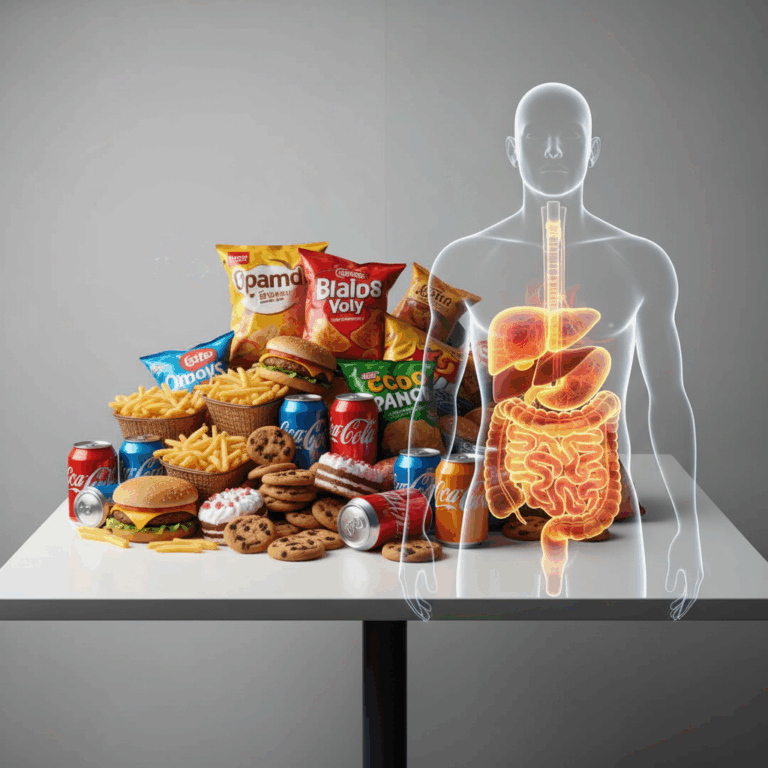Main effects of ultra-processed food on metabolism
Frequent consumption of ultra-processed foods directly impacts metabolism, disrupting key processes that regulate energy and bodily balance. Their high content of simple sugars and unhealthy fats is responsible for these changes.
These foods cause adverse metabolic responses, such as spikes in blood glucose and alterations in insulin sensitivity, which can lead to chronic metabolic conditions if high consumption habits are maintained.
In addition, certain additives present in ultra-processed foods contribute to inflammatory processes that affect overall metabolic function, increasing the risk of diseases related to metabolism and the cardiovascular system.
Impact on insulin resistance and blood glucose
Ultra-processed foods cause rapid and high spikes in blood glucose, which in turn increases the demand for insulin to regulate it. This repeated process can lead to insulin resistance.
Insulin resistance is a condition in which cells respond less effectively to this hormone, hindering the entry of glucose and causing significant metabolic imbalances that predispose to type 2 diabetes.
Foods with high levels of refined carbohydrates and simple sugars facilitate these glycemic spikes, causing the body to adapt negatively to glucose management, affecting metabolic health in the short and long term.
Chronic inflammation and its relationship with metabolic function
Regular consumption of ultra-processed foods induces chronic low-grade inflammation, primarily caused by trans fats and refined oils present in these products. This inflammation affects metabolic signaling.
This persistent inflammatory state interferes with the normal function of metabolic organs, such as the liver and adipose tissue, increasing susceptibility to metabolic disorders and cardiovascular complications.
The inflammatory process associated with these foods also contributes to increased oxidative stress and alters hormonal regulation, hindering the maintenance of a healthy metabolism and increasing associated risks.
Components of ultra-processed foods that alter metabolism
Ultra-processed foods contain various components that negatively affect metabolism. These ingredients disrupt the body's energy and hormonal homeostasis, leading to metabolic imbalances.
The main elements include simple sugars, unhealthy fats, and chemical additives which, when combined, affect glucose regulation and inflammation, increasing health risks.
Simple sugars and refined carbohydrates
Simple sugars and refined carbohydrates present in ultra-processed foods cause rapid spikes in blood glucose, generating an excessive effort for the body to produce insulin.
This frequent consumption can lead to insulin resistance, hindering the efficient use of glucose and promoting an imbalance in blood sugar levels in the long term.
Furthermore, these ingredients lack fiber and essential nutrients, which impairs the feeling of satiety and can encourage overconsumption and weight gain.
Unhealthy fats and refined oils
Trans fats and refined oils are common in ultra-processed foods and contribute to chronic inflammation, a key factor in disrupting metabolism and developing diseases.
These fats increase the accumulation of lipids in tissues and modify cell function, which negatively impacts lipid metabolism and insulin sensitivity.
Furthermore, its excessive consumption is linked to cardiovascular and metabolic dysfunctions, complicating weight control and overall health.
Chemical additives and endocrine disruptors
Additives present in ultra-processed foods, such as certain colorings and preservatives, can act as endocrine disruptors, interfering with the hormones that regulate appetite and metabolism.
This hormonal alteration makes it difficult to maintain energy balance and can increase the predisposition to metabolic diseases by deregulating key functions such as the secretion of insulin and leptin.
The impact of these compounds is still being studied, but evidence indicates that they contribute to inflammation and metabolic dysfunction when consumed regularly.
Long-term consequences of excessive consumption
Excessive consumption of ultra-processed foods is linked to an increased risk of serious metabolic diseases. These effects are due to the sustained disruption of the body's metabolic balance.
Furthermore, maintaining a diet high in ultra-processed foods can negatively affect hormonal health and appetite control, further complicating the body's ability to regulate weight and energy.
Increased risk of metabolic diseases
Frequent consumption of ultra-processed foods significantly increases the risk of obesity, type 2 diabetes, and cardiovascular disease due to insulin resistance and chronic inflammation.
These foods promote the accumulation of visceral fat and lipid imbalances, which are key factors in the appearance of metabolic disorders and associated long-term complications.
The combined effect of simple sugars, trans fats, and additives contributes to a progressive deterioration of metabolism, which can trigger complex and difficult-to-manage chronic diseases.
Hormonal dysregulation and appetite
Regular consumption of ultra-processed foods alters the hormonal regulation linked to appetite, such as the hormones leptin and ghrelin, causing difficulties in controlling hunger and satiety.
This dysregulation can lead to a cycle of overeating and excessive calorie consumption, making it difficult to maintain a healthy body weight and promoting increased body fat.
Furthermore, some additives in these foods act as endocrine disruptors, intensifying hormonal disruption and negatively affecting energy metabolism and body balance.
Strategies to limit the metabolic impact
Controlling the consumption of ultra-processed foods is essential for maintaining metabolic balance and preventing disease. A diet based on natural and fresh foods should be prioritized.
Energy balance is key to avoiding weight gain related to excessive consumption of ultra-processed foods, as these products easily provide excess calories.
Energy consumption control and balance
Reducing the consumption of ultra-processed foods decreases the intake of sugars, trans fats and additives, factors that impair metabolic function and promote inflammation.
Maintaining a proper energy balance involves balancing calories consumed with calories expended, thus avoiding overweight and insulin resistance.
Planning meals with nutritious foods and limiting processed snacks helps regulate appetite and improve the body's metabolic response.
Recommendations for optimal metabolic health
It is recommended to increase the consumption of fruits, vegetables, lean proteins and healthy fats, which support metabolic function and reduce inflammatory risk.
Incorporating daily physical activity also improves insulin sensitivity and helps maintain a balanced metabolism.
Likewise, avoiding frequent consumption of sugary drinks and ultra-processed products promotes hormonal control and body energy balance.







